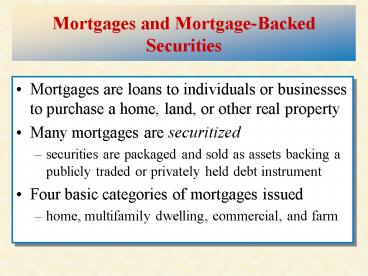Mortgages and MortgageBacked Securities
1 / 15
Title:
Mortgages and MortgageBacked Securities
Description:
Mortgages are loans to individuals or businesses to purchase a home, land, or ... or 'Ginnie Mae') and Federal Home Loan Mortgage Corp. (FHLMC or 'Freddie Mac' ... – PowerPoint PPT presentation
Number of Views:68
Avg rating:3.0/5.0
Title: Mortgages and MortgageBacked Securities
1
Mortgages and Mortgage-Backed Securities
- Mortgages are loans to individuals or businesses
to purchase a home, land, or other real property - Many mortgages are securitized
- securities are packaged and sold as assets
backing a publicly traded or privately held debt
instrument - Four basic categories of mortgages issued
- home, multifamily dwelling, commercial, and farm
2
Mortgage Characteristics
- Lien - a public record attached to the title of
the property that gives the FI the right to sell
the property if the mortgage borrower defaults - Down payment - a portion of the purchase price of
the property a FI requires the mortgage borrower
to pay up front - Private mortgage insurance - insurance contract
purchased by a mortgage borrower guaranteeing to
pay the FI the difference between the value of
the property and the balance remaining on the
mortgage
(continued)
3
- Federally insured mortgages - originated by FIs
with repayment guaranteed by either the Federal
Housing Administration (FHA) or the Veterans
Administration (VA) - Conventional mortgages - issued by FIs that are
not federally insured - Amortized - when the fixed principal and interest
payments fully pay off the mortgage by its
maturity date - Balloon payment mortgages - requires a fixed
monthly interest payment for a three- to
five-year period with full payment of the
mortgage principal required at the end of the
period
(continued)
4
- Fixed-rate mortgage - locks in the borrowers
interest rate and thus the required monthly
payment over the life of the mortgage, regardless
of market rate changes - Adjustable-rate mortgage - where the interest
rate is tied to some market interest rate with
potential for change in required monthly payments
over the life of the mortgage - Discount points - interest payments made when the
loan is issued (at closing). One discount point
1 percent of the principle value of the mortgage
5
Traditional Mortgage
- Traditional mortgages
- Long term typically 30 years
- Fixed rate
- Borrower can pre-pay some or all of the loan at
any time without penalty
6
Risks of Investing in Traditional Mortgages
- Interest Rate Risk
- Prepayment Risk
- Contraction Risk rates fall
- Extension Risk rates rise
- Credit Risk
- Liquidity Risk
7
Factors Affecting Prepayments
- Mortgage Rates
- Spread between contract rate and market rate
- Path of market rates
- Level of market rates
- Characteristics of Underlying Mortgages
- Seasonal Factors
- General Economic Activity
8
Mortgage Businesses
- Today there are three distinct businesses
associated with mortgages - Origination
- Servicing
- Investing
- In the past savings associations dominated the
mortgage market and they performed all of these
functions
9
Secondary Mortgage Market
- Advantages for FI to securitize
- reduces prepayment risk, liquidity risk, interest
rate risk, and credit risk of FIs portfolio - FI retains income from origination fees and
service fees - FIs remove mortgages from their balance sheet
through one of two mechanisms - pool recently originated mortgages together and
sell them in the secondary market - issue mortgage-backed securities that are backed
by their newly originated mortgages
10
History of Secondary Mortgage Markets
- Federal National Mortgage Association (FNMA or
Fannie Mae) created during the Great Depression - FHA and VA insured loans also created during this
time - Government National Mortgage Association (GNMA or
Ginnie Mae) and Federal Home Loan Mortgage
Corp. (FHLMC or Freddie Mac) created during
1960s - Wide variety of mortgage-backed securities have
been developed and in 1999, approximately 50 of
mortgages are securitized
11
Mortgage Sales
- Mortgage sale - sale of a mortgage originated by
a bank with or without recourse to an outside
buyer - Allow FIs to manage prepayment risk, interest
rate risk and credit risk, achieve better asset
diversification and improve their liquidity risk - FIs encouraged to sell loans for economic
(generation of fee income) and regulatory reasons
(reducing cost of reserve requirements) - Major buyers of mortgage loans are domestic
banks, foreign banks, insurance companies and
pension funds, closed end bank loan mutual funds,
and nonfinancial corporations - Major sellers of mortgage loans are money center
banks, small regional or community banks, foreign
banks, investment banks
12
Securitization of Mortgages
- Pass-through mortgage securities -
mortgage-backed securities that pass-through
promised payments of principal and interest on
pools of mortgages created by financial
institutions to secondary market participants
holding interests in the pools - Issued in standard denominations, usually 25,000
with increments of 5,000 beyond the minimum - Three government owned or sponsored agencies
involved - Ginnie Mae (GNMA), Fannie Mae (FNMA,
and Freddie Mac (FHLMC)
13
Stripped Mortgage Securities
- Principal Only (PO) investor receives all
principal payments from the underlying pool of
mortgages - Interest Only (IO) investor receives all
interest payments form the underlying pool of
mortgages
14
Collateralized Mortgage Obligations
- CMO - a mortgage-backed bond issued in multiple
classes or tranches - tranches - a bond holder class associated with a
CMO - Created by packaging and securitizing whole
mortgage loans or resecuritizing pass-through
securities - Attractive to secondary mortgage market investors
because they can choose a particular CMO class
that fits their maturity needs
15
CMO Tranches
- Sequential Pay
- Accrual
- Floating Rate
- Floater
- Inverse Floater
- Planned Amortization Class
- Companion or Support































